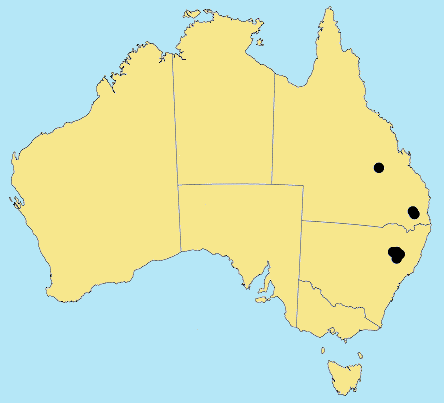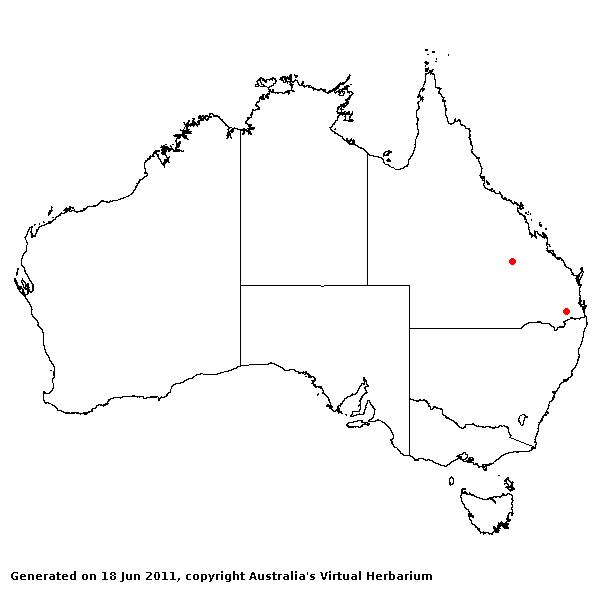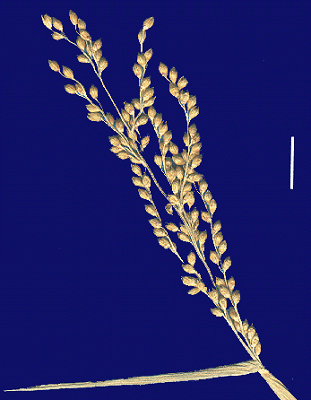Urochloa fusca* (Roem. & Schult.)
Kunth. Rev. Gram. i. 31 (1829).
Classification. (GPWG 2001) : Subfamily
Panicoideae. Paniceae.
Basionym and/or
Replacement Name: Panicum
fasciculatum Poir., Encycl. 4:
731 (1798), non Swartz (1788).
Type of Basionym or Protologue Information: Est vraisemblablemnt originaire de la
Jamaique, (HT: P).
Recent synonyms:
Brachiaria fasciculata.
Key references
(books and floras): [2002] D.Sharp & B.K.Simon, AusGrass, Grasses of
Australia (as Brachiaria), [2008] S.W.L.Jacobs, R.D.B.Walley &
D.J.B.Wheeler, Grasses of New South Wales (394).
Illustrations:
[2008] S.W.L.Jacobs, R.D.B.Whalley & D.J.B.Wheeler, Grasses of New South
Wales, 4th edn (394 as U.fasciculata var. reticulata).
Habit. Annual.
Rhizomes absent. Stolons absent. Culms decumbent, 20–120 cm tall. Mid-culm
internodes glabrous or pubescent. Mid-culm nodes pubescent. Leaf-sheaths
glabrous on surface or hairy. Ligule a fringe of hairs, 1 mm long. Leaf-blades
lanceolate, 3–20(–30) cm long, 5–15 mm wide. Leaf-blade surface indumented.
Inflorescence.
Inflorescence compound, a panicle. Racemes 3–20, 1–8 cm long, 3–4 mm wide.
Central inflorescence axis 6–15 cm long.
Spikelets.
Spikelets pedicelled. Fertile spikelets 2-flowered, the lower floret barren
(rarely male), the upper fertile, comprising 1 basal sterile florets,
comprising 1 fertile floret(s), without rachilla extension, obovate, dorsally
compressed, 2.4–3.1 mm long.
Glumes. Glumes
dissimilar, thinner than fertile lemma. Lower glume ovate, membranous, without
keels, 1–5 -nerved. Upper glume obovate, 2.5–3.1 mm long, membranous, without
keels, 7 -nerved. Upper glume surface glabrous. Upper glume apex mucronate. Florets.
Basal sterile florets 1, male, with palea. Lemma of lower sterile floret 100 %
of length of spikelet, membranous, 7 -nerved.
Fertile lemma 2.2–2.9
mm long, without keel. Lemma apex mucronate. Palea without keels.
Continental
Distribution: Australasia, North America, and South America.
Australian
Distribution: Queensland, New South Wales.
Queensland:
Darling Downs, Leichhardt. New South Wales: North-Western Slopes.
Notes.
Introduced. Native to Texas and northern Mexico but now widely introduced. In
tropical and subtropical wet sclerophyll forests, dry sclerophyll forests,
Brigalow forests, tropical and subtropical sub-humid woodlands, temperate
sub-humid woodlands, and semi-arid shrub woodlands. Frequently occurs as a weed
but is occasionally grown for grain. Flowers Jan.-June.



